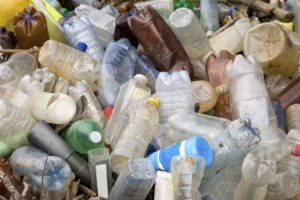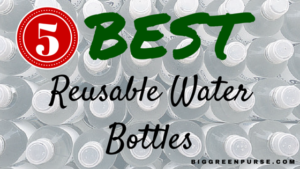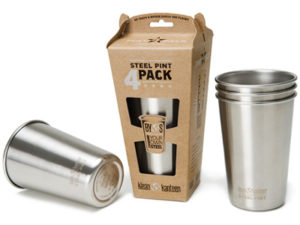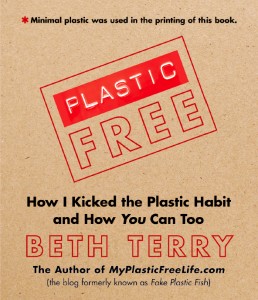If it’s not easy to recycle something, is it really recyclable?
That’s a fair question to ask, since we consumers are constantly being reassured that a product is “green” or “greener” because it is “recyclable” – even when, in reality, the product is barely being recycled at all.
 Consider single-use plastic water bottles. Companies that manufacture the billions of plastic water bottles flooding the market claim the product is “eco friendly” because the bottles are recycleable.
Consider single-use plastic water bottles. Companies that manufacture the billions of plastic water bottles flooding the market claim the product is “eco friendly” because the bottles are recycleable.
In reality, only 12% of the 15 billion throwaway water bottles manufactured each year are being recycled. As a result, 40 million plastic bottles are thrown into the trash or otherwise become litter – every day. And the millions of gallons of petroleum used to manufacture and transport those bottles? That’s pretty much gone down the tubes, too.
What’s the best solution? Stop buying plastic water bottles and drink water from a reusable mug or cup.
What’s the reality? At least for the foreseeable future, water will be sold in plastic bottles. In fact, bottled water is the single largest growth area among all beverages, including alcohol, soda and juice, reports MSNBC.
That being the case, manufacturers should make good on their claim that their bottles are recyclable by putting a deposit on the bottles to ensure they’re returned to a recycling facility.
Such “bottle bills” are nothing new. Since the first bottle bill was passed in Oregon in 1971, ten states have followed suit, including California, Maine,Vermont, Iowa, Michigan, Delaware, Hawaii, New York, and Massachusetts (full disclosure: I helped pass the laws in Michigan, Delaware, Iowa and Massachusetts). However, only three states – California, Hawaii and Maine – include water bottles in their program.
Do deposit laws work? According to the Container Recycling Institute, states with bottle bills on the books recycle 80% of beverage containers generally. Deposits as little as five cents per bottle are effective, but in states like Michigan, which requires deposits of a dime on a beverage bottle or can, 95% of containers are being recovered.
Which begs the question: why not pass a NATIONAL bottle bill to increase recycling?
Consumers would have a financial incentive to return the bottles for recycling, taxpayers would save money on litter pick up and the wasteful use of petroleum, and the environment would become cleaner as a result.
Seems like a big return for an investment of a dime, doesn’t it?
 For more ideas on how to deal with plastic, don’t miss this month’s Green Moms Carnival, hosted by Beth Terry over at www.fakeplasticfish.com.
For more ideas on how to deal with plastic, don’t miss this month’s Green Moms Carnival, hosted by Beth Terry over at www.fakeplasticfish.com.
















10 thoughts on “Want to Increase Plastic Bottle Recycling? Put a Deposit on It.”
Where I live those bottles have a 5 cents deposit and it works really well, but I don’t know the percentage of recovered bottle.
The only problem is that recycling center are in great problems due to the economic recession and due to the fact that they do not have aluminum and plastic to resell to make a little benefit.
However I still think that the whole deposit thing is a great thing and I don’t think that our governments will let die these recycling center anyway…
I have never heard of a plastic bottle deposit my goodness that’s brilliant!
Great post! I never understood why water bottles didn’t have a bottle deposit. I think a national bottle bill could really help a lot.
Yes, I agree, we need a national bottle bill!
Recycling plastic bottles is not the answer. Recognizing that we do not need to make them in the first place is. Even if you recycle a plastic bottle, it cannot be made into a new bottle. 100% of plastic bottles are brand new.
I am living in a developing country and there must be some monetary value associated with plastic water bottles because there are old guys gathering up massive quantities of them from the roadsides. Whatever the value is, it’s not enough to prevent litter and the entrepreneurs choose their collection routes based on efficiency.
I grew up in Massachusetts and saw the difference before and after the bottle deposits went in place. Amazing motivation – and I wholeheartedly agree with the idea.
I think plastics of all kinds need to have a visible recycling symbol. More times than not, I find it near impossible to find the recycling number on the plastic. I had to call one company to find out what # the plastic bottle was. They should be visible (without a magnifying glass). Also they should not allow plastic items including packaging unless it is a recyclable plastic. Plastic packaging should also have a # on it. If Zyrtec and Q-tips can do it so can all companies. Remember when things were bottled with glass?Things taste so much better in glass. Sure it breaks, so do plastic jars sometimes.
One of the main issues regarding the recycling of plastic is lack of opportunity to recycle. This is partly because plastic can be contaminated with other materials and the cost of processing this can outweigh the cost of producing more plastic so compared to other materials like glass and paper, there are fewer places to recycle plastic. However, plastic is lightweight and highly versatile and one way round this is to re-use plastic within the home.
Paper, plastic as well as old electronic gadgets can now be turned into something useful or entertaining thanks to those who have made efforts in helping us deal with what most of us consider as trash already.